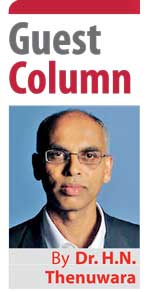Thursday Feb 19, 2026
Thursday Feb 19, 2026
Tuesday, 29 October 2024 02:01 - - {{hitsCtrl.values.hits}}

 The 2024 Nobel Prize for Economics was awarded to three economists, Daron Acemoglu, Simon Johnson and James A. Robinson on 14 October 2024. Both Daron and Simon are professors at Massachusetts Institute of Technology (MIT), Cambridge, Massachusetts, USA, and James is a professor at the University of Chicago (U Chicago), Chicago, Illinois, USA. Both MIT and U Chicago are private research universities. They were established in 1861 and 1890 respectively using private endowments, and students pay to attend those universities.
The 2024 Nobel Prize for Economics was awarded to three economists, Daron Acemoglu, Simon Johnson and James A. Robinson on 14 October 2024. Both Daron and Simon are professors at Massachusetts Institute of Technology (MIT), Cambridge, Massachusetts, USA, and James is a professor at the University of Chicago (U Chicago), Chicago, Illinois, USA. Both MIT and U Chicago are private research universities. They were established in 1861 and 1890 respectively using private endowments, and students pay to attend those universities.
Nobel prizes are awarded by the Nobel Foundation in Sweden using an endowment of funds given by Alfred Nobel in 1895. Alfred Nobel was a Swedish chemist, engineer, and inventor, who is best known for inventing dynamite. The prize was awarded to innovate work in Physics, Chemistry, Medicine (Physiology), Literature, and Peace.
The Nobel Prize in Economics was established later in 1968 by Sveriges Riksbank (Sweden’s central bank) in memory of Alfred Nobel, to mark the bank’s 300th anniversary. This prize, officially called the Sveriges Riksbank Prize in Economic Sciences in Memory of Alfred Nobel, is not one of the original five Nobel Prizes established by Alfred Nobel’s will in 1895, but it is administered by the Nobel Foundation alongside the other Nobel Prizes.
Importance of political and economic institutions
The most significant contribution by the three Nobel laureates was to demonstrate the importance of political and economic institutions in shaping the prosperity or failure of nations. Their research, particularly focusing on the legacy of colonial institutions, highlights how ‘inclusive’ institutions promote long-term development, while ‘extractive’ institutions create inequality and hinder growth. This research has profound implications for understanding why some countries succeed economically while others struggle.
The inclusive institutions are found in developed countries as well as countries that were colonies of Europeans where they have settled down. Those institutions fall into five categories. First, institutions that create markets by maintaining the law and order, a sound legal system and an independent judiciary to create markets and new economic activities. Second, institutions that promote markets and economic activities leading to high economic growth and setting off industrial revolutions. Third, institutions that stabilise markets and maintain economic and price stability. Fourth, institutions that regulate markets and counter anti-competitive practices, address market failures, and take actions against evils such as insider trading. Fifth, institutions that legitimise the markets by providing safety nets and social welfare measures to those who are weak and destitute.
Benefits inclusive institutions bring to a country
In summary, those institutions support democratic political systems, secure property rights, help maintain rule of law, provide mechanisms to ensure that the majority of people have access to economic resources, maintain checks and balances on political and executive power, help prioritise the provision of public goods such as education, healthcare, infrastructure, and social safety nets, encourage innovation by rewarding merit and allowing creative individuals to contribute to economic growth, and support competitive markets that are open to everyone, preventing monopolies or special privileges for elite groups. Those are only a few among vast number of benefits inclusive institutions bring to a country.
European colonial masters did not set up inclusive institutions in colonies where they had no intention of settling down, and their only intension was to extract resources. Sri Lanka is one of those countries where British have installed extractive institutions.
Extractive institutions, in contrast to inclusive institutions, are structured to benefit a small elite at the expense of the broader population. They do not secure property rights. Property can be arbitrarily seized by those in power or manipulated to benefit the political cronies. In those countries the rule of law is either absent or selectively applied. Laws serve the interests of the elite, and those in power are not held accountable for abuses. Public goods and public infrastructure are often neglected or poorly provided. Investments in these areas are minimised because they do not directly benefit the elite, leading to underdevelopment and inequality.
These institutions concentrate wealth and power in the hands of a few thereby easily promoting ‘democratic backsliding’ a phenomenon where a democracy falls into a dictatorship, or an autocracy. Many countries in Sub-Saharan Africa and Latin America that gained independence in the aftermath of the second world suffered from democratic backsliding because of weak institutions.
Weak and extractive institutions
Furthermore, weak and extractive institutions create powerful politicians and bureaucrats. Those individuals may enjoy the power and amass wealth for themselves, while the country slides down to decay and bankruptcy. There are many other weaknesses of these institutions that stifle economic growth and development.
After gaining independence, some countries like Singapore have reformed the extractive institutions left by colonial masters into inclusive institutions, while others like Sri Lanka have been slow to carry out required reforms.
Signs that countries have not reformed those extractive institutions into inclusive institutions are seen in widespread corruption and low degree of international competitiveness. For example, the corruption perception index compiled by the Transparency International, a global research institution, ranked Sri Lanka at 115 out of 180 countries in 2023, indicating a significantly high degree of corruption. The least corrupt country with the rank one was Denmark, while Singapore was occupying the rank five.
The global competitiveness index is computed using 12 factors. Those are institutions, infrastructure, Information and Communication Technology adoption, macroeconomic stability, health, skills, product market, labour market, financial system, market size, business dynamism, and innovation capability. Sri Lanka’s rank was 84 (in 2019) while Singapore was the top-ranking country.
Signs of future prosperity for a country like Sri Lanka are gradually falling corruption perception index and gradually rising degree of competitiveness. Corruption perception falls when institutions are reformed while competitiveness rises when new development strategies are designed and implemented. Both seem to be challenging tasks faced by the new Government in Sri Lanka.